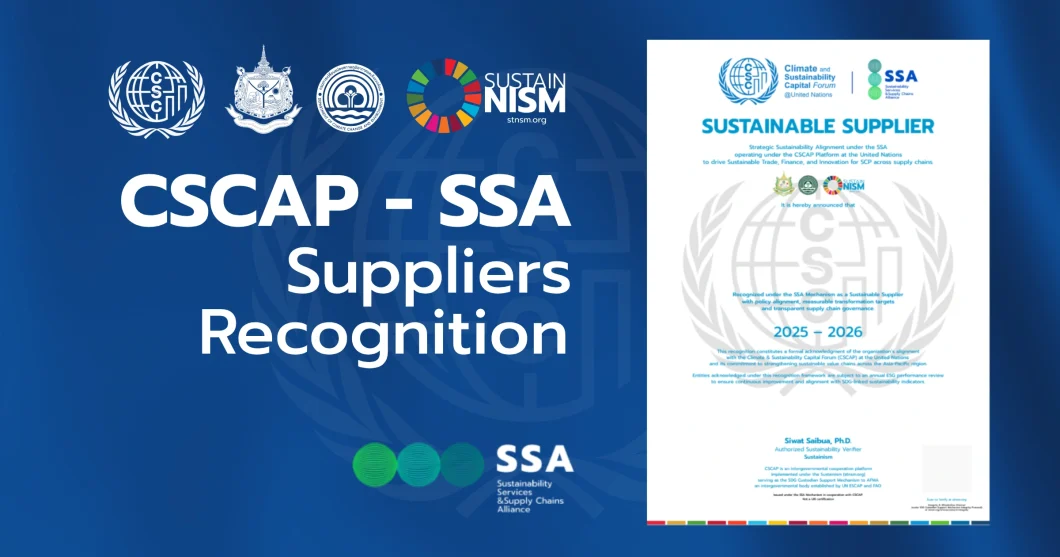Linking Suppliers, Buyers and Finance Systems to Build a Sustainable Consumption and Production (SCP) Framework under the CSCAP Cooperation at the United Nations (UN ESCAP)
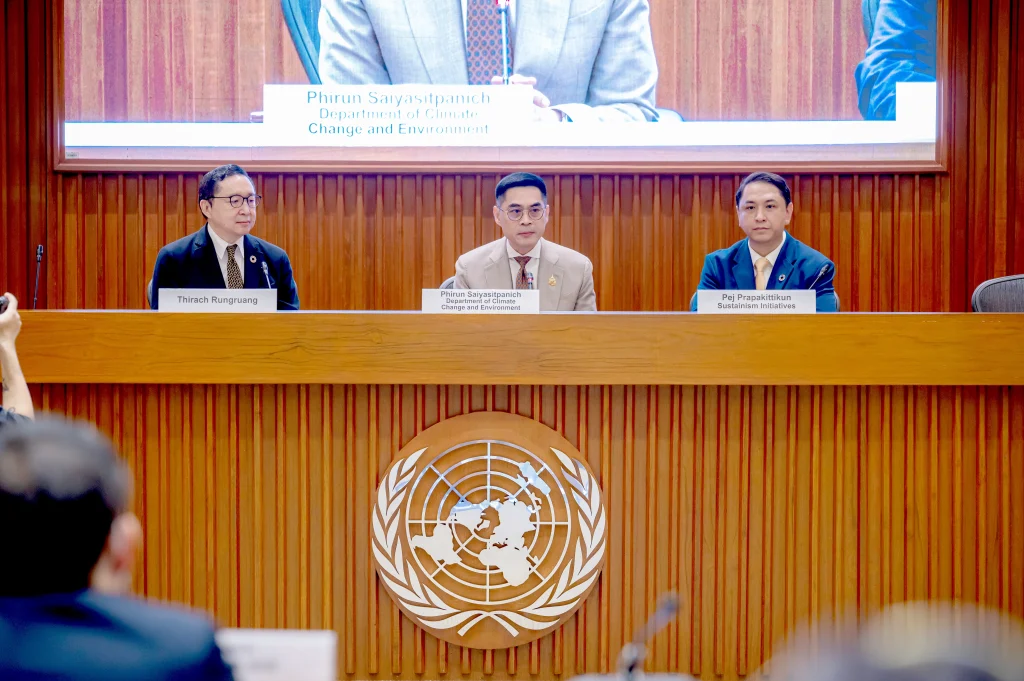
The SSA Impact Chain functions as a systemic cooperation framework designed to connect Suppliers, Buyers, and Financial and Investment Institutions within a unified chain that promotes transparency, traceability, and measurable outcomes across environmental, social, and economic dimensions—from production at the source to markets and finance at the destination.
Under the Climate and Sustainability Capital Forum (CSCAP) at the United Nations (UN ESCAP), this mechanism drives the economic transition in alignment with the Sustainable Development Goals (SDGs)—in particular SDG 12: Sustainable Consumption and Production and SDG 17: Partnerships for the Goals.
The SSA Impact Chain is therefore not merely a business or partnership concept, but a strategic transition instrument—a bridge that unites markets, capital, and natural resources to foster an economy that is transparent, responsible, and sustainable in the long term.
Why Recognition under the CSCAP at UN ESCAP Matters
Recognition under the CSCAP platform at UN ESCAP constitutes an affirmation of institutional legitimacy at the United Nations level. It operates under the coordination of the Sustainism Initiative, serving as the SDG Custodian Support Mechanism to AFMA—an intergovernmental organization established by UN ESCAP and FAO.
1. Global Legitimacy
Referencing SDG indicators through a UN-aligned mechanism ensures that an organization’s data and disclosures are acknowledged across policy, trade, and investment contexts both nationally and internationally.
2. Visibility and Trust
Participating organizations appear in verified databases utilized by buyers, investors, and policymakers, reducing duplication in due diligence processes while strengthening market and investor confidence.
3. Accelerating SDG 12 and Advancing SDG 17 — with Broader Cross-SDG Impact
Participation in the SSA Impact Chain transforms declarations into measurable outcomes within real supply chains. It advances efficient resource use (SDG 12.2), waste reduction (SDG 12.5), and corporate sustainability disclosure (SDG 12.6.1) through multi-stakeholder collaboration.
Furthermore, the systemic cooperation among suppliers, buyers, financial institutions, investors, and government agencies directly contributes to other interrelated SDGs—ensuring that sustainability becomes operational rather than aspirational.
Accelerating SDG 12, Strengthening SDG 17, and Generating Cross-Cutting SDG Outcomes
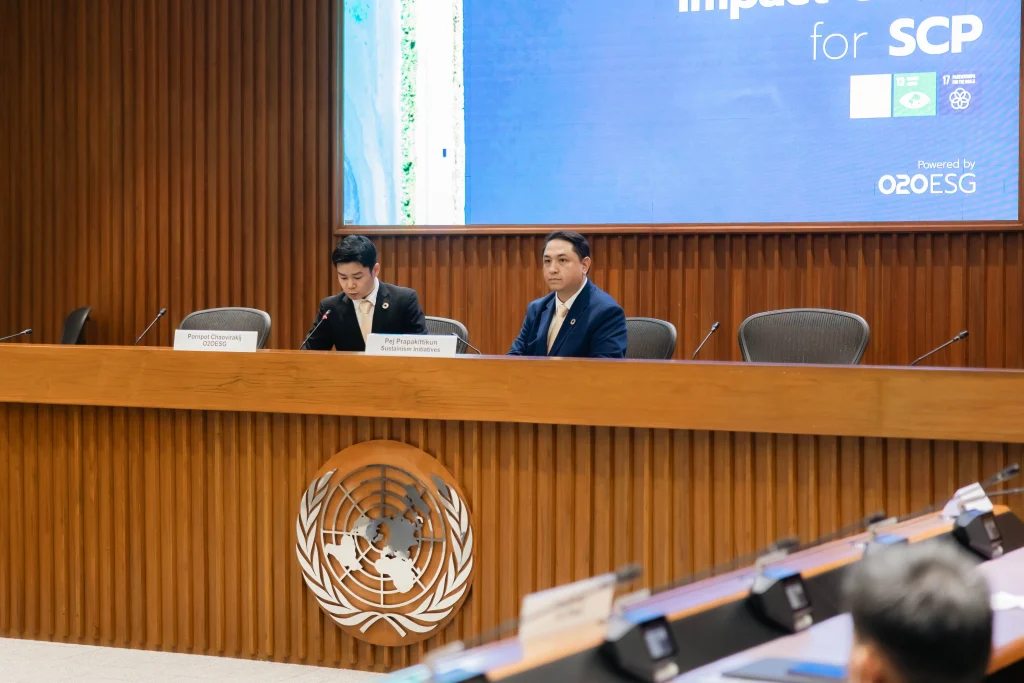
Engagement in the SSA Impact Chain, under the CSCAP Forum at UN ESCAP, not only accelerates progress on SDG 12 (Sustainable Consumption and Production) and enhances SDG 17 (Partnerships for the Goals), but also delivers systemic impacts across other environmental, social, and economic targets.
This mechanism transforms declarations into measurable results, turning every activity within the supply chain into evidence-based impact that can be monitored and reported. Examples include:
- SDG 12.2 – Efficient Resource Use:
Businesses within the SSA system adopt production and procurement practices that minimize resource use, enhance energy efficiency, and strengthen circular-economy models. - SDG 12.5 – Waste Reduction:
Promotion of material reuse, recycling, and product-design innovation reduces waste generation along the production-to-consumption cycle. - SDG 12.6.1 – Corporate Sustainability Disclosure:
Participants are guided to develop a Sustainability Impact Note, providing transparent, verifiable data on environmental and social performance in alignment with UN standards.
In addition, SSA participation reinforces other SDGs:
- SDG 8 – Decent Work and Economic Growth: Empowering SMEs to enter sustainable markets creates stable, dignified employment and inclusive growth.
- SDG 9 – Industry, Innovation and Infrastructure: Supporting innovative SMEs to link with large buyers and investors enhances technological capacity and industrial competitiveness.
- SDG 13 – Climate Action: Measurement and reduction of GHG emissions (Scope 1–3) are enabled through auditable ESG data within the SSA system.
- SDG 15 – Life on Land: Green procurement and regenerative agriculture support biodiversity conservation and sustainable forest management.
Thus, the SSA Impact Chain serves as a true SDG Accelerator, enabling businesses not only to align with global goals but to drive them through daily operations—transforming corporate sustainability into tangible global impact.
Joining SSA means transforming intention into verifiable change —
turning business action into a collective force for a sustainable future for all.
Organizations Recognized under the CSCAP–SSA Mechanism
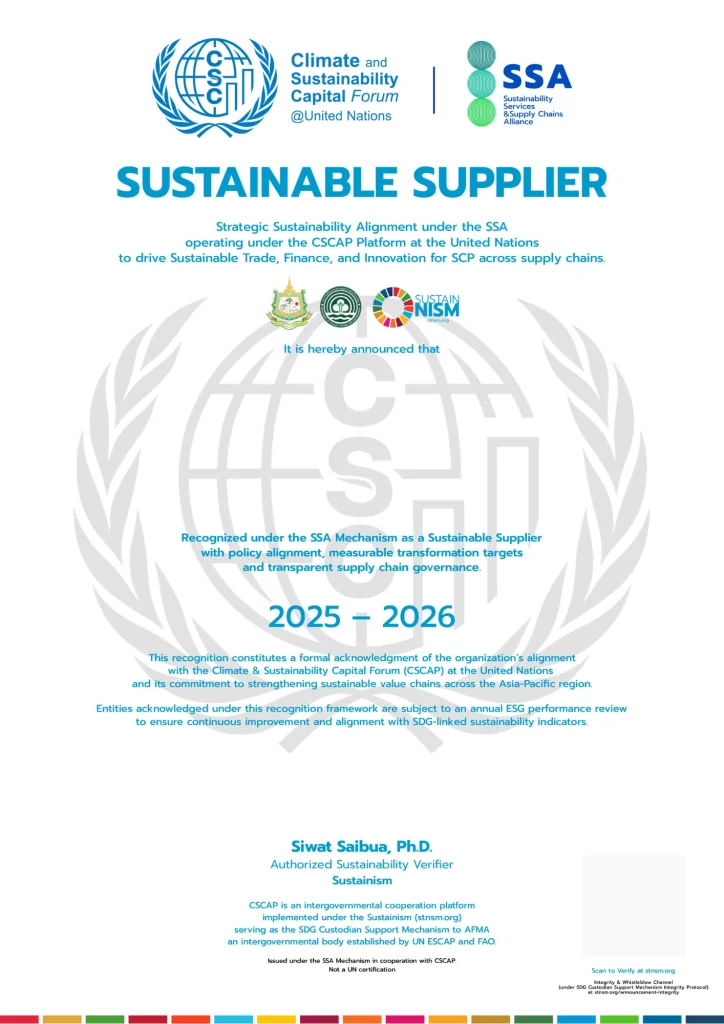
To demonstrate concrete achievements under the SDG Custodian Support Mechanism, several leading enterprises in Thailand and the Asia–Pacific region have been officially recognized as Sustainable Suppliers on the CSCAP platform at UN ESCAP, including:
South East Asia
- Heavy Green – Heavy Organizer co.,ltd
- Greenery – Creative Move co.,ltd
- Clean Mahanakorn co.,ltd
- Dr.EX – Demetex Solution co.,ltd
- BTT – Ball Technic (Thailand) co.,ltd
- GET Solutions (Thailand) co.,ltd
- DinoQ AI – Enterprise Laboratory co.,ltd
Europe (Other)
- Corsair Group International
These organizations provide living proof that sustainability is not merely a moral imperative, but a form of economic capital—creating trust, investment readiness, and international trade opportunities through verified ESG performance.
Tangible Outcomes of the SSA Mechanism in Strengthening Sustainable Consumption and Production (SCP)
The CSCAP–SSA Mechanism operates as a Transformative Linkage System—converting multi-sectoral cooperation into measurable impact. Its core objective is to build a stable, transparent, and scalable SCP framework at both national and regional levels.
- Sustainable Suppliers (SMEs):
Directly connected to major buyers, financial institutions, and public funding agencies—expanding market access, finance opportunities, and ESG capacity building. - Innovative Suppliers:
Supported in strategic investment or acquisition processes through financial advisors to enhance competitiveness and regional market presence. - Domestic Buyers:
Utilize SSA data to demonstrate leadership in green supply chains, improving transparency for investors and qualifying for policy-linked incentives. - Domestic Buyers to Global Markets:
Transition from local purchasers to export leaders by linking to the Sustainable Buyer Network under CSCAP, opening new international trade and investment pathways. - International Buyers:
Access Thailand’s verified green supply chains, invest in eligible green projects with fiscal incentives, and receive formal recognition as Sustainability Partners at the UN ESCAP CSCAP Forum. - Producers and Farmers at the Source:
Benefit from premium pricing for environmentally responsible raw materials while participating in Nature Restoration initiatives that revitalize soil, water, and ecosystems, thereby enhancing livelihoods in the threefold dimensions of People – Planet – Prosperity.
Pathways to Join the SSA Mechanism
Organizations may participate in the CSCAP–SSA Mechanism according to their capacity and strategic objectives through two primary pathways:
- Collaborative Project Development and Publication
Co-develop impact metrics, prepare a Sustainability Impact Note, and present verified results at the CSCAP Forum at UN ESCAP, achieving policy-, market-, and finance-level recognition. - Participation as a Sustainable Supplier or Sustainable Buyer
- Sustainable Supplier: Producers or service providers meeting ESG criteria are listed in the Sustainable Supply Chain Registry, enabling visibility to buyers and financial institutions.
- Sustainable Buyer: Corporations and listed companies procuring through the SSA system receive Buyer Recognition at CSCAP for demonstrating green supply chain leadership and regional partnership excellence.
Conclusion – The Power of Connection for a Sustainable Future
The SSA Impact Chain exemplifies a collaborative model that converts sustainability into economic capital—transforming commitments into outcomes, and transactions into shared value for People, Planet, and Prosperity.
It provides a verified, transparent pathway through which suppliers, buyers, and investors may be formally recognized at the United Nations, advancing a collective transition toward a transparent, inclusive, and sustainable global economy under the CSCAP framework at UN ESCAP.
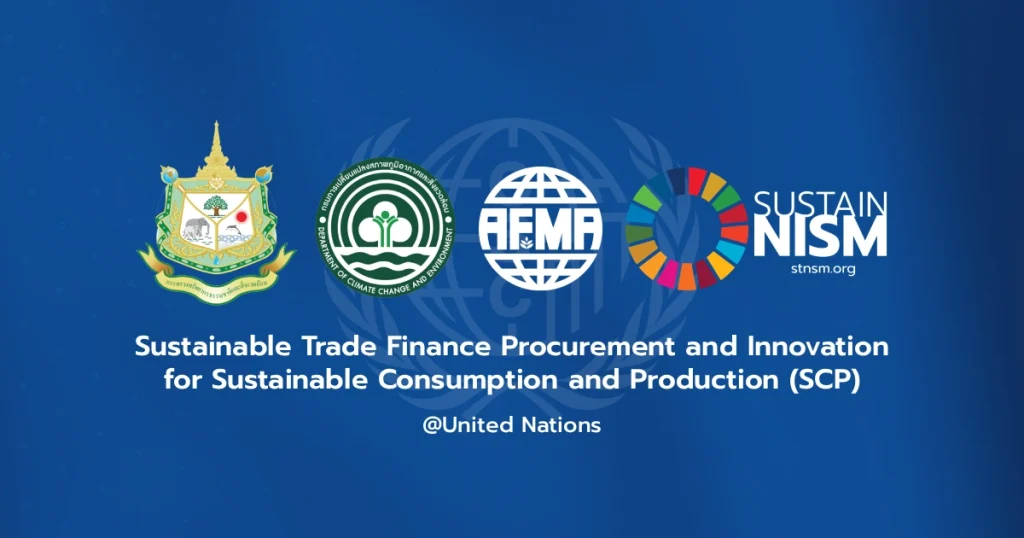
Contact O2OESG — National Focal Point & Activation Partner in Thailand
+66 970344225, +66 970343220
or activation@o2oesg.com


